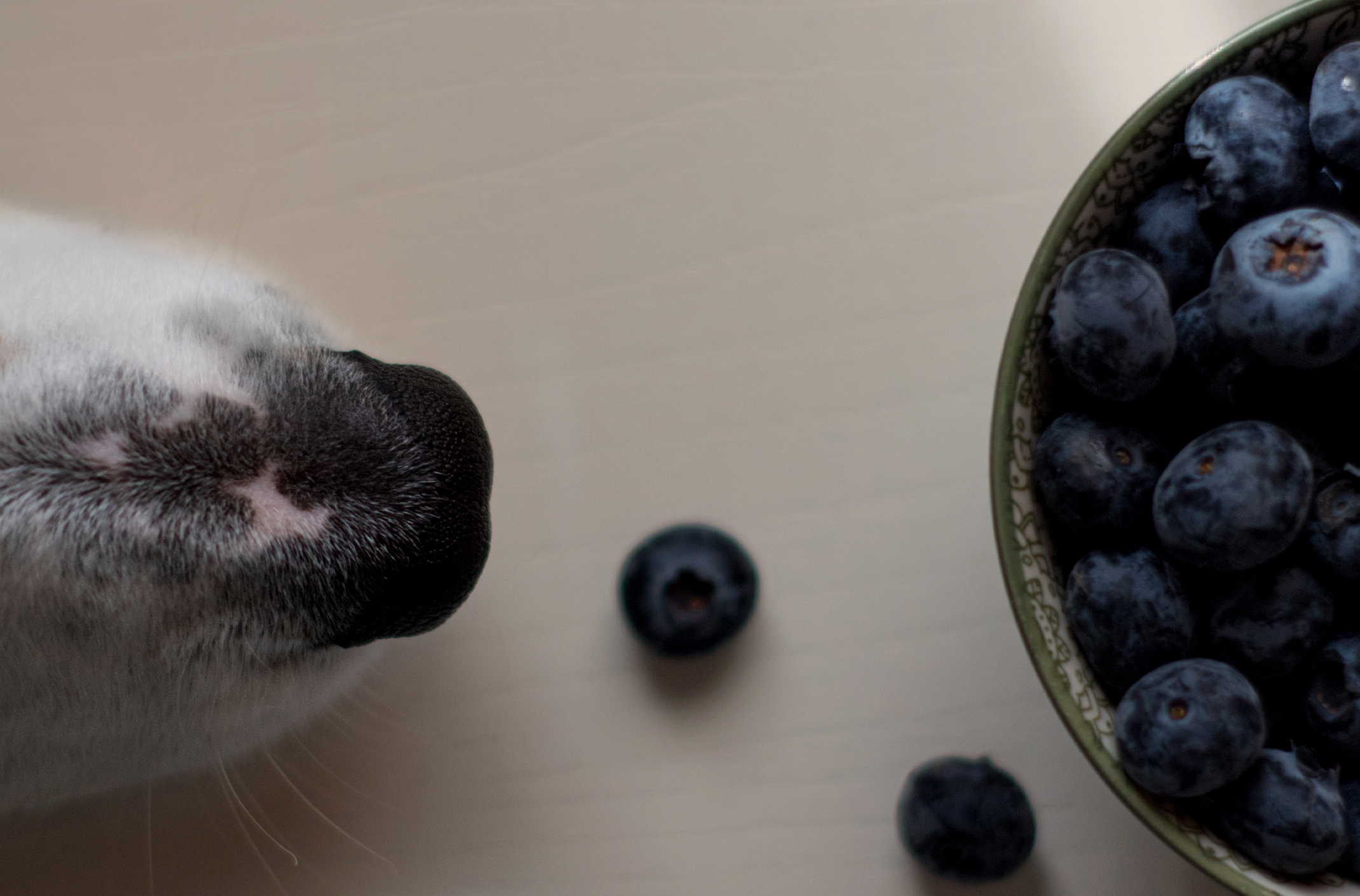Blueberries are a nutrient and antioxidant-rich superfood, and can make a great snack for most dogs and puppies. Not only are they delicious — they’re bite-sized, and packed with health benefits.
In fact, blueberries are one of our favorite healthy, dog-friendly fruits — which is why we’ve included them in almost every single one of our Jinx products, including our kibble and biscuits.
Read on to learn about the benefits of blueberries for dogs, serving suggestions, appropriate portion sizes, and specific cases where it’s not safe to feed your dog blueberries.
Are Blueberries Good For Dogs?
Blueberries are nutritional powerhouses, making them an excellent, healthy treat for your pup.
According to the American Kennel Club, blueberries are low in calories, and contain high amounts of vitamin C, fiber, and phytochemicals (naturally occurring chemical compounds found in plants). Vitamin C and fiber are vital components of proper canine nutrition — helping to support immunity and healthy digestion. Meanwhile, phytochemicals are linked to several aspects of health, including the ability to fight cancer in humans.
Blueberries are also loaded with antioxidants, which help protect from cell damage caused by free radicals. Specifically, blueberries are packed with a special class of antioxidants called anthocyanins, which play an important role in protecting your dog's blood vessels and lowering blood pressure. We’ll go into more detail on the many benefits of blueberries for dogs in the next section.
Health Benefits of Blueberries for Dogs
Blueberries are a superfood that’s chock-full of nutrients and health benefits for your pup. Here are some of the potential perks of blueberries for dogs:
Improved Brain Function
Blueberries can help maintain brain function and even improve memory. They appear to benefit aging neurons, leading to improved brain function as your dog ages.
Studies have shown that a dog’s cognitive function can be improved by adding foods that are rich in antioxidants to their diet. Blueberries are an easy way to give your dog the antioxidants they need to support their brain as they grow older.
Reduce Inflammation
The high levels of antioxidants in blueberries play a key role in helping your dog's body reduce inflammation. Specifically, the anthocyanins in blueberries play a critical role in reducing chronic inflammation (which can lead to disease if left untreated).
The anthocyanins in blueberries also have beneficial effects on your dog's insulin sensitivity and glucose metabolism. Just like with humans, obesity and diabetes can have negative impacts on your dog's health, so it’s important to keep these things in check.
Reduce Muscle Soreness
Research has also shown that blueberries may reduce the damage that occurs at the molecular level after your dog engages in strenuous exercise and activity — helping to reduce muscle soreness.
Can Blueberries Be Bad for Dogs?
In general, blueberries are safe for most dogs. However, if your dog has diabetes, food sensitivities, or is on a prescription diet to manage a medical condition, then you probably shouldn’t feed them high-sugar fruits like blueberries.
Too much sugar is bad for any dog, and can cause an upset stomach or diarrhea. So, be sure to feed your pup blueberries in moderation, and stick to small portion sizes.
It’s also important to note that there is a potential choking hazard with blueberries if you have a small dog, especially with frozen blueberries. Always monitor your pup when feeding them treats or snacks.
Finally, wild blueberries are also safe for dogs to eat — just make sure to check that they’re actually blueberries, as some other wild berries can be poisonous for dogs.
How Many Blueberries Can A Dog Eat?
Even though blueberries are very healthy for dogs, they should only be given in small portions. In fact, treats of any kind should make up no more than 10% of your dog's overall diet — the other 90% should come from a well-balanced dog food.
So, what is the appropriate serving size? How many blueberries can a dog eat safely? The answers to these questions vary by breed size, so here are some general guidelines:
- Extra-small dogs (2-20 lbs.)= 1-2 blueberries. Examples: Yorkies, Chihuahuas, Pomeranians, Pugs.
- Small dogs (21-30 lbs.)= 2-3 blueberries. Examples: Basenjis, Beagles, Mini Australian Shepherds.
- Medium-size dogs (31-50 lbs.)= 3-5 blueberries. Examples: Basset Hounds, Border Collies, Australian Cattle Dogs.
- Large dogs (51-90 lbs.)= 5-6 blueberries. Examples: Pit Bulls, German Shepherds, Labs, Australian Shepherds.
- Extra-large dogs (91+ lbs.)= a small handful of blueberries. Examples: Newfoundlands, Bernese Mountain Dogs, St. Bernards, Great Pyrenees.
Serving Suggestions
There are many ways to feed your pup nutrient-packed blueberries. Here are a few of our favorites ways to serve blueberries for dogs:
- Fresh blueberries (wash them first, and remove the stems).
- Dog food or treats that contain blueberries (try our irresistible Jinx Kibble or savory-with-a-touch-of-sweet Bone Broth Biscuits).
- Crunchy, refreshing frozen blueberries.
- Mashed blueberries (mix them in with your dog’s food).
- Dried blueberries (if you have a dehydrator at home, make your own dried blueberries — store-bought dried blueberries may contain added sugar and preservatives).
- Pureed blueberries (mix with other dog-friendly fruits or xylitol-free peanut butter, pour into an ice cube tray, and freeze for a tasty treat).
FAQs
Can Dogs Eat Blueberry Muffins?
Think twice before you share a blueberry muffin with your pup. While blueberries are healthy for dogs, all of the sugar in muffins is not. Plus, depending on the ingredients, there may be something in the muffin that’s toxic for your canine companion — like chocolate, xylitol, or nutmeg.
That being said, if your dog eats a small piece of blueberry muffin that fell on the floor, they should be fine. But if the muffin contained any ingredients that are toxic to dogs — or your dog happened to sneak a large amount of muffins — then contact your vet immediately.
Can Dogs Have Blueberry Yogurt?
Store-bought blueberry yogurt isn't a good option for your dog. It’s likely to have a high sugar content, which can upset your pup’s stomach and cause diarrhea. Over time, too much sugar can also cause obesity, diabetes, and cavities.
Packaged blueberry yogurt may also contain xylitol, which is toxic to dogs. So, instead of buying blueberry yogurt at the grocery store, try mixing a handful of fresh blueberries with plain, sugar-free, xylitol-free yogurt. In small portions, this can be a healthy and tasty treat for your pup.
And if your dog does eat blueberry yogurt that contains xylitol, contact your vet immediately.
Can Dogs Eat Dried Blueberries?
Dried blueberries can make a healthy snack for your pup, but there are some important things to consider before you start feeding them to your dog.
Store-bought dried blueberries often contain preservatives, as well as a very high sugar content. This isn't healthy for your dog, and may cause stomach problems. The safest way to feed your little buddy dried blueberries is by drying them yourself using a dehydrator.
Can Dogs Be Allergic to Blueberries?
It's unlikely that your dog is allergic to blueberries, but there's always a chance that they could have an allergy or sensitivity to a specific food. It’s best to start off by feeding them a really small amount of blueberries at first, then keep an eye out for signs of an upset stomach or skin irritation before increasing the amount.
If your pup does have an upset stomach after eating blueberries, it may not be caused by an allergy. Overfeeding your pup blueberries could also cause gastrointestinal distress — so stick to the portion sizes mentioned earlier in this article, and don’t overdo it!
Can Puppies Have Blueberries?
Yes, puppies can eat blueberries — but as with adult dogs, moderation is key. A blueberry or two won't hurt your puppy, but keep in mind that their gut is more sensitive than that of an older dog. It’s best to limit treats, and to start small when introducing them to blueberries.
At Jinx, we're here to upgrade the way you care for your dog by providing holistic nutrition made with thoughtful formulation, real ingredients, and a whole lot of love. Treat your dog to our pup-approved Kibble or Bone Broth Biscuits (both made with vitamin and antioxidant-rich blueberries!) today.

